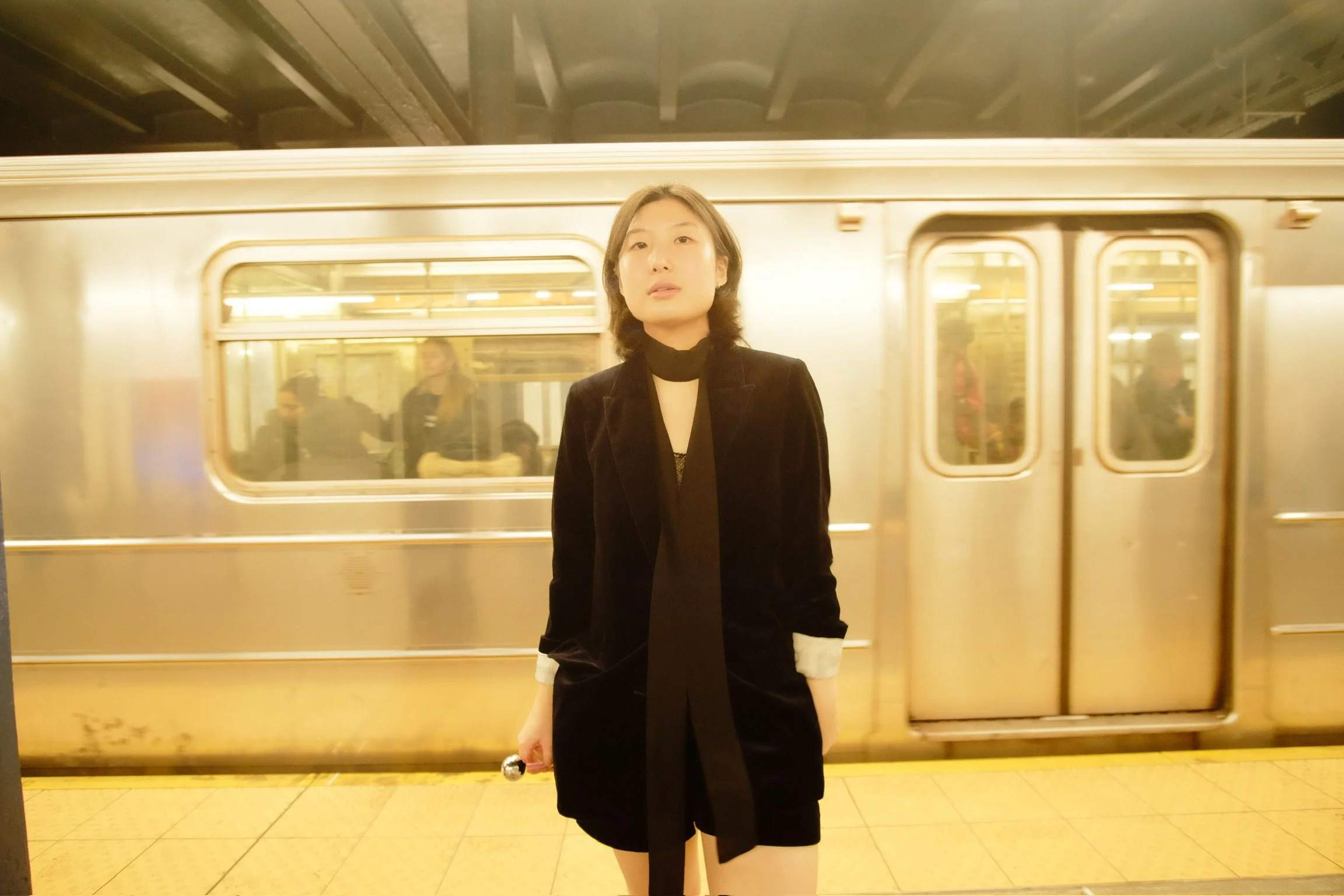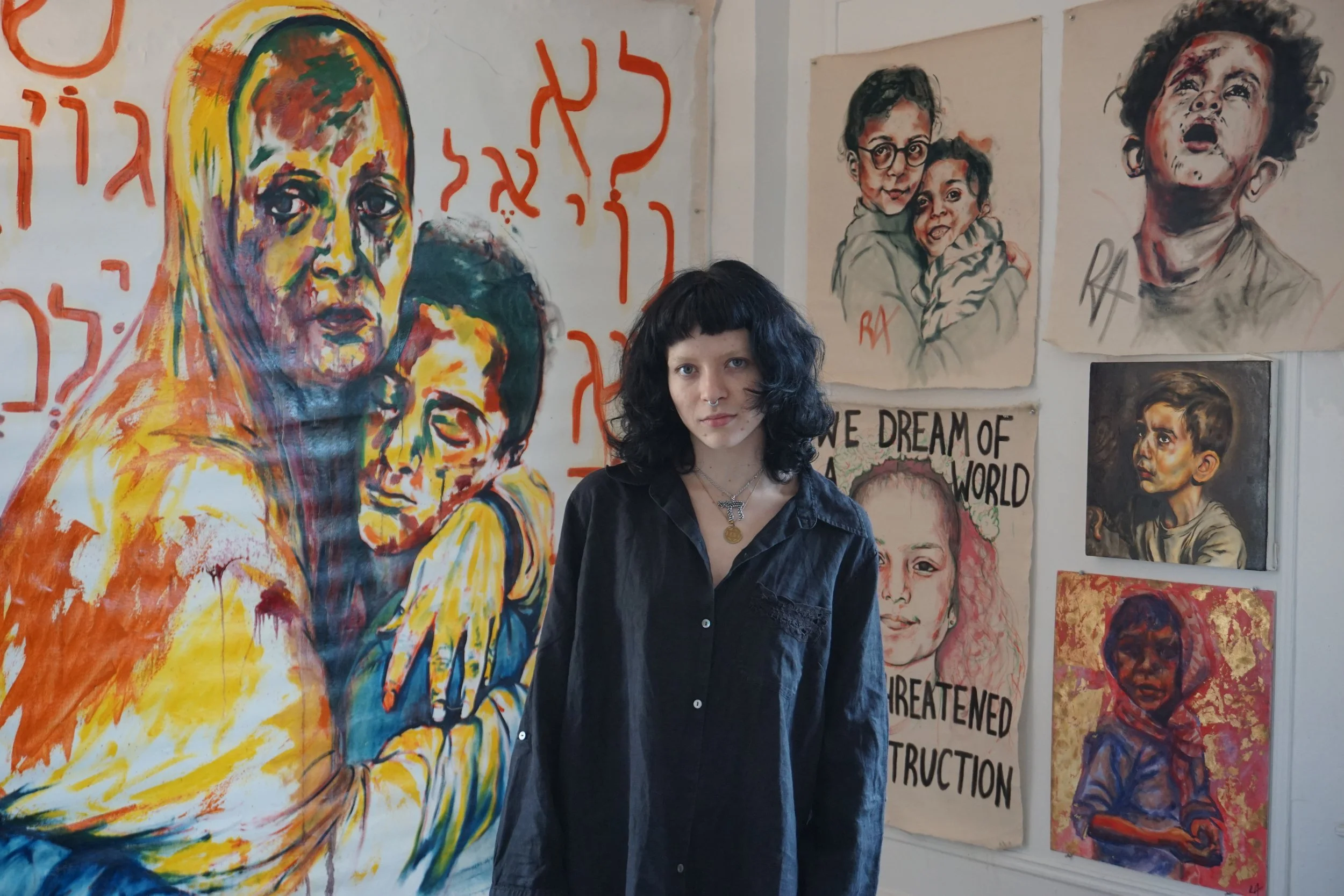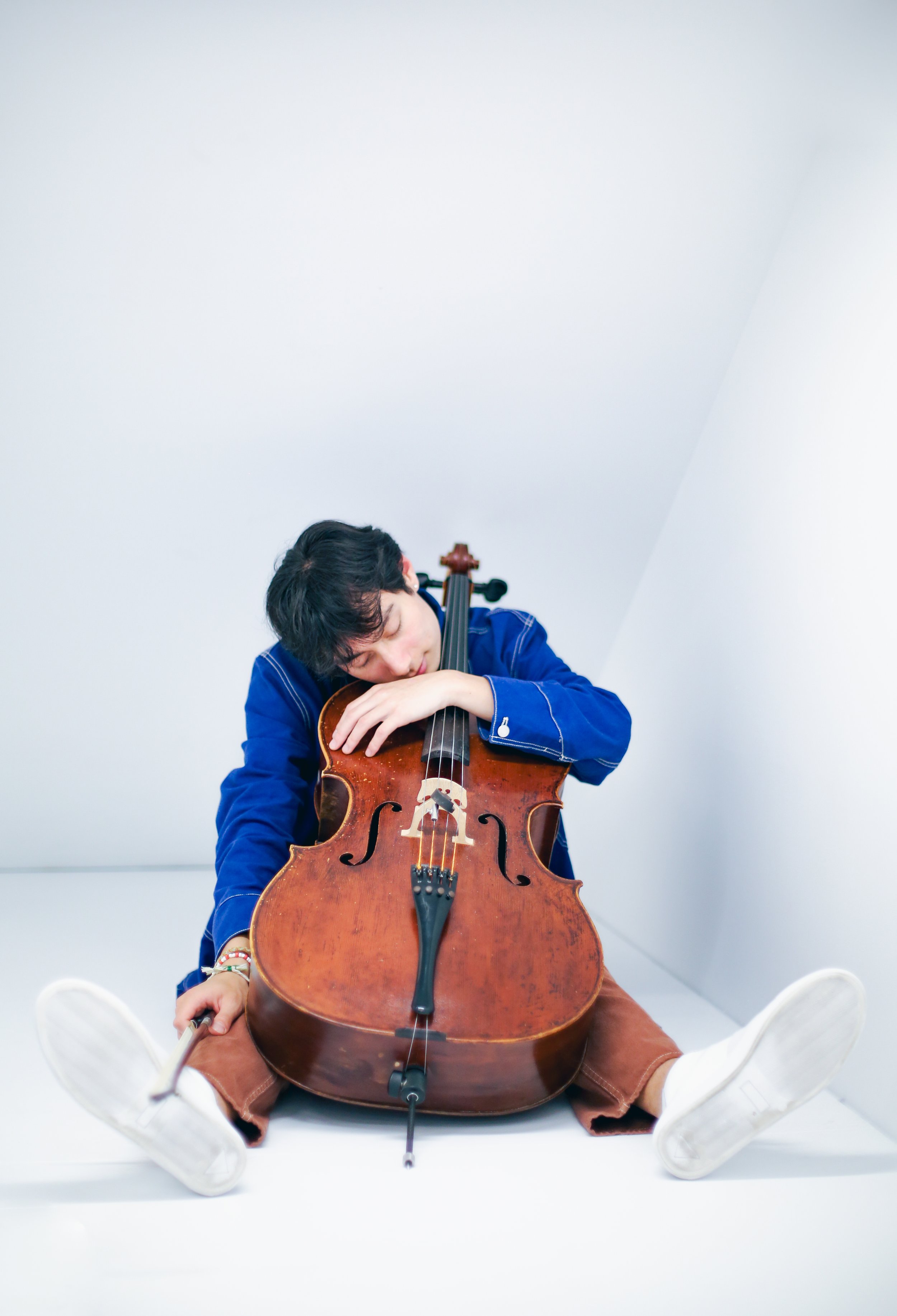Feature by Fatima AlAryani
Photos by Frances Cohen and Lauren Zhou
Daniel Weitz is a senior at Columbia College studying music and physics. He is also an American composer of contemporary concert music, jazz, and scores for film. His artistic process principally features a technique called media or inspiration laundering.
The weather is sullen on the day Daniel and I meet for our interview. It is hardly drizzling but the tinge of gray in the sky is overbearing, that point in time when the seasons are both at the brink of a beginning and an end. On my way to Law Bridge—our agreed meeting point—I notice Daniel walking a few steps ahead of me, and I watch quietly as he strides. I wonder… what does a musician listen to in a walk through the rain?
The answer, as Daniel shares once we’ve shared our greetings, is Ms. Lauryn Hill. When I say that I am in the early stages of my Ms. Lauryn Hill (mis)education, Daniel smiles widely—opening the SIPA door, our shelter from the rain—and says, “Lucky.” The care Daniel has for music, for sound, is quietly reinforced.
Daniel towers over me and responds to all of my questions with terrifying clarity. He wears light wash skinny jeans, a white t-shirt, and a plaid flannel shirt. A pair of silver, round earrings, engraved with a highly intricate pattern, hang from his ears.
We head down to the fifth floor of SIPA and find an empty classroom, the interview already subverting all my expectations of order and structure, decidedly characterizing itself for its fluctuation and spontaneity. I feel embarrassed, but Daniel was easy-going, moving with the flow and seeming undisturbed by any interruptions.
We seat ourselves in the windowless classroom, white lights beaming overhead. My iPhone turned upwards, I press the record button on my voice memo app and ask my first question—eyes shifting quickly to my elaborate notes—as I enunciate: “I just want to start with the basics and give you room to introduce yourself. Who are you?”
“My name is Daniel Weitz,” he begins, “and I am a 21-year-old American composer. I primarily do concert music and film scores.”
Daniel is careful to define his work across four themes: birth, becoming, collapse, and destruction. He groups birth and becoming as a singular category, and collapse and destruction as another, but they all appear to exist in a continuum in his music. The themes almost follow a story, the narrative of a protagonist undergoing a bildungsroman. A coming-of-age or lifecycle.
We see this, for example, in Daniel’s composer’s notes for his quintet score Infants of Further Life. A score inspired by the first two stanzas of Muriel Rukeyser’s “A Birth” Daniel writes: “The project of this piece is to sonically invoke Rukeyser’s conception of the relationship that each of us has with our own childhood, with our own vulnerable, naked, uncertain, yet beautiful beginning.
Birth being so thematically central, I find myself curious as to where Daniel’s composer identity was born.
In response, Daniel tells me a story. According to familial lore—lore indeed because he isn’t sure of its authenticity—Daniel’s family was at a dinner party, and in attendance was a family friend who happened to be a professional cellist. At some point that evening, the cellist plays, leaving Daniel utterly mesmerized and desperate to learn the glorious instrument, thereby unfolding his current world.
Growing up near Boston College—at the intersection of Chestnut Hill and Newton—Daniel fell in love with the Western and Romantic canon of music. Anchoring his pre-college education were auditions, competitions, orchestras, chamber groups, and the wholehearted pursuit of becoming a professional cello player.
“I went to The Rivers School for high school, which has a conservatory program embedded in it where 10% of the students are musicians. I was a cellist there, but I also took some composition classes.” Soon, however, the intensity of playing the cello at school and for extracurriculars became overwhelming, and Daniel sought a means for rest and creativity.
“I started playing jazz piano and jazz guitar for fun. Guitar started as a campfire activity and my older brother was a jazz pianist. I was very inspired by him and could borrow his materials.”
What started as reprieve and play soon became a site for self-discovery: “Playing instruments other than the cello exposed me to an ensemble vision where I was playing with harmonies all the time. That made me want to compose a lot, because I had different instruments in my arsenal. And I could see that they played distinct roles.”
But Daniel didn’t start taking composing seriously until he came to Columbia, where he’s now a senior studying music (predictably) and physics (not-so-predictably)!
Physics doesn’t define Daniel’s identity the way music does—he does not call himself a physicist like he calls himself a musician: “The reason I [pursue both music and physics] is not because of their intersection. People say, oh, there's stuff that you can do with acoustics. But I do it for education, not vocation. I really want to study two very disparate things that interpret the world in opposition to each other because it allows me to have a more holistic and robust understanding of it.”
Seldom do I come across individuals whose personal curiosities defined their education path. One of Columbia’s unique characteristics as an educational institution is its pre-professionalism, its “student-to-intern-to-investment banker pipeline,” so it can feel isolating to trek through a not-so-clear career path. Pursuing an art form of any kind as one’s primary vocation in an increasingly capitalist world is daunting.
When I share these sentiments with Daniel, he admits that he experiences these anxieties as well. For him, there’s a limited degree of safety in pursuing physics in addition to music.
“I'm gonna give myself five years to just do music after undergrad and apply to music master’s programs, knowing that I [could return to my physics] degree. If needed, I could apply to physics programs, and maybe make a life for myself there.”
Even with such intense dedication in composition and music, Daniel is still afraid of putting himself in a box, of limiting his possibilities. “Oftentimes, I feel regret… I think I'm wasting so much of my time doing this and that, when I don't even expect to do it professionally. Why am I still playing so much cello? I'm not a performer anymore!
One belief I uphold is that anything in life will make me a better composer. My wider experiences help me as a creative person. All my mentors have taken years off of music to do other, unrelated things. It has made their music better and they’ll self-report that. And it makes a lot of sense to me. So maybe I can trick myself into thinking oh, it's for the craft.”
The words of Henry David Thoreau echo in my ears: “how vain is it to sit down to write when you have not stood up to live.” To become a better composer, Daniel studies physics, performs in the Columbia Orchestra, in chamber groups, in musical theater shows. Examples of work and dedication that are peripheral yet necessary. “I just can’t live without them. I’ve put myself in these social circles my whole life. It feels really off when I don’t have that experience and don’t connect with its people.”
The shift from performance to composition came to Daniel in a time defined by fluctuation—by birth and destruction—the pandemic: “I realized that so much of my cello playing was social. And so when I was stuck at home alone, practicing, I lost motivation in a way that I didn't expect. Being in a vacuum forced me to confront that I would rather compose.” At a time where performance was rendered impossible, composition—a form of creation that is time-intensive and also transferable via the Internet—became the outlet for human connection Daniel sought.
Daniel’s composition scores read almost like a novel, the narrative aspect reinforced all the way through. Each music score starts with a cover page displaying the title, ensemble, and composer’s name. The next page is the composer’s notes, containing the inspiration for the score—typically poetry—and a message of gratitude. The page before the actual score are notation specifications to guide the musicians.
It’s clear that Daniel puts a lot of effort into his composer’s notes—they read like the preface of a book, ready to welcome you into a journey. The act of composing—I learn—requires more than just a connection to music, but to writing as well.
In Glass’ composer’s note, Daniel includes the self-written poem that first guided the creation of the score. Although he originally had no intention of making it into a musical piece, sound and its diction reverberates all throughout it. Even when Daniel writes a poem, he is conscious of sound, of musicality.
This process of transferring one form of art into another is what Daniel calls inspiration-laundering: “Oftentimes, if I'm tasked to create a piece, I'll listen to something that I really love while doing some sort of art—usually poetry or sculpture. In my mind, I'm a sponge absorbing the emotive human essence from the art I'm listening to. And months later—because then that means I've forgotten the specifics—I can compose based on the art that I created.”
There is a lineage of inspiration that flows from one medium to another, a story outside of the narrative each composition holds, where older creative artifacts are made into a final musical score.
“Though the medium is sonic,” Daniel describes, “the main goal is to create imagery in one's mind. Our minds are very powerful, and they can do that, and not ascribe or prescribe what those images should be.”
There is also an unpredictably and self-governing nature to Daniel’s creative process. He began writing the Infants of Further Life for class without knowing where it was headed. Often, the music dictates to Daniel what his subject matter should be in a way he does not choose. He may approach a piece with singular purpose on one day, and realize that the music is beckoning to be made into something different the very next.
With Infants of Further Life, the piece told Daniel that it was a baby.
It was only upon this realization and further writing that Daniel started looking for poetry about birth to inspire the rest of the piece. “It kind of goes from one to another to another back to the music, so it's not as linear as it sounds. You create modules and then you arrange it in a way that's convincing as linear.”
From there, theories develop about the role of the different instruments about the vibrant world Daniel conjures within the score. “If the clarinet is vocal, and it's whimpering and babbling and singing, then what are the other instruments doing? How do I fit them into the narrative?”
If a piece self-governs itself in Daniel’s work, then who names each piece? “I think about the title of my pieces for a very long time. They are the best articulation of how I am in a certain moment.”
For instance, the title for Infants of Further Life came to Daniel in a moment when he felt like “a child masquerading as an adult,” while Glass was a response to an upsetting situation, making Daniel want “to scream and shatter things.” The name becomes obvious when the narrative and emotions are clear.
However, the process is a little different when it comes to film scores, another manifestation of Daniel’s composition. “I'm very lucky that the student directors that I've worked with have given me a lot of agency; they'll have a loose idea and will use words to describe it. But sometimes, it's hard to use language to describe music if you don't do it all the time. And so their descriptions end up being up to my interpretation as well. When the music is subservient to [a larger film or story], it also opens me up creatively.”
Scoring films can feel liberating, especially when contemporary academia expects young composers to be vanguarding the future. “You must be pushing the envelope in some sort of way to be taken seriously. In a post-modern world, people say that you can make anything and be fine, but in my experience, it doesn't feel to be true.
If you compose pieces in a very certain aesthetic, more doors will open to you. And I actually do love how art music is, and playing that game. But it can also be caging.”
Right now, Daniel is writing a piece called May I Come In? for violin, cello, percussion, drum set, and piano. It’s an interactive piece between musician and instrument, where each musician takes their turn to knock on their instruments—as if knocking on a door—and asking the instrument if anyone is home. “And then people all whisper welcome and play the instruments in these kinds of luscious cascades in a very impressionist sort of way, with instruments inviting you in.”
But beyond concert music created for class and music scores created for student films, what does Daniel’s music sound like when it’s made just for him?
When there’s no ensemble to play his score or an audience gazing upon a silver screen, Daniel returns to sonic meditations—a practice created by American composer Pauline Oliveros. Perhaps he’ll take his cello and play Bach cello suites. Other times, he’ll pick up his guitar and sing (he was listening to Ms. Lauryn Hill earlier that day because he’s trying to cover her).
“They’re good palate cleansers. They bring me back to the live act of creation and listening, which ultimately should anchor everything else you do.”
Watch his video interview:



































